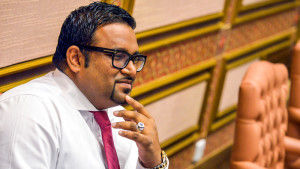Vice president’s impeachment ‘unconstitutional,’ contends lawyer
Ahmed Adeeb’s lawyer contends that the president does not have the power to reduce the constitutionally-mandated period for the vice president to respond to charges from 14 days to seven days by declaring a state of emergency. Several prominent lawyers as well as the main opposition party concurs.

06 Nov 2015, 09:00
The parliament’s impeachment of detained Vice President Ahmed Adeeb yesterday was “unconstitutional,” his lawyer Hussain Shameem contends.
In a decree declaring a nationwide state of emergency on Wednesday, President Abdulla Yameen reduced the constitutionally-mandated period for the vice president to respond to charges from 14 days to seven days.
“That was unconstitutional. And there is no way a detained person can attend the parliament unless the police brings him,” Shameem told reporters upon arriving in Malé from Sri Lanka last night.
Shameem said Adeeb was not informed that the 14-day period had been shortened and was not allowed to defend himself at yesterday’s sitting of parliament.
Become a member
Get full access to our archive and personalise your experience.
Already a member?
Discussion
No comments yet. Be the first to share your thoughts!
No comments yet. Be the first to join the conversation!
Join the Conversation
Sign in to share your thoughts under an alias and take part in the discussion. Independent journalism thrives on open, respectful debate — your voice matters.




